Experts Say This Is One Of The Main Reasons Why Weight Loss Stalls For People
"Hearst Magazines and Yahoo may earn commission or revenue on some items through these links."
Whatever your reason for losing weight, you want it to be safe, effective, and sustainable. But even when you feel like you’re doing everything "right," it’s extremely frustrating when the extra pounds won’t budge. If you’re Googling “Why am I not losing weight?” you’ve come to the right place.
Here’s the thing: Weight loss isn’t just about nutrition and exercise. (But those things are important!) “It also depends on your age, gender, and starting weight,” says obesity expert Matthew Weiner, MD, the director of bariatric surgery and the medical director of telemedicine at Tucson Medical Center. For young adults, it’s easier—they can sometimes lose up to 20 percent of their body weight by eating right and working out, Dr. Weiner notes. But for postmenopausal women, doing the same can potentially contribute to five to seven percent.
Plus, it takes a bit longer for women to see results. “Men do tend to lose weight faster than women, but when you look at the total amount of weight loss over time, it’s not as different as you might think,” Dr. Weiner says. “It might take men two to three months to lose 10 percent, while it takes women five to six months.” And again, that's going to be dependent on many factors.
Still, it’s totally possible for women to lose weight healthily—which means losing half a pound to two pounds per week, says Brigitte Zeitlin, MPH, RD, CDN, health coach and BZ Nutrition founder. “Weight loss is super individualized,” she reiterates.
That said, there are a variety of reasons why you might not be losing weight. Zeitlin says that women sometimes overestimate the amount of calories they burn when working out. Also, many diets focus on what you take out of your diet, leaving women to not eat enough food—either enough daily calories, or nutrient-filled foods. (You’ll want to eat proper amounts of both protein and veggies.) Since humans are built for survival, not eating enough might end up sending your body into starvation mode, which is when your metabolism slows down and your bod holds onto calories so it can have fuel to think straight and energy for the day.
If you’re struggling to shed pounds, the 25 reasons ahead might help you understand why your weight-loss journey has been tougher than usual. Thankfully, experts give ways to combat all of them.
Meet the experts: Supriya Rao, MD, is a quadruple board-certified physician in internal medicine, gastroenterology, obesity medicine, and lifestyle medicine who focuses on digestive disorders, gut health, the microbiome, obesity medicine, and women's health. Matthew Weiner, MD, is the director of bariatric surgery and the medical director of telemedicine at Tucson Medical Center. Brigitte Zeitlin, MPH, RD, CDN, is a health coach and BZ Nutrition founder. Keri Gans, RD, is an NYC-based nutritionist and the author of The Small Change Diet. Jessica Cording, RD, CDN, is a nutritionist and the author of The Little Book of Game-Changers.
25 Reasons You’re Not Losing Weight
1. You’re underestimating your strength gains.
If your clothes are looser but the weight on the scale isn’t budging (or maybe it’s a little heavier), you might be building muscle and losing body fat (AKA body recomposition). As a refresher, your body consists of water mass, muscle mass, and fat mass, which add up to equal your entire weight. Muscle mass refers to the total amount of muscle in the body, including the skeletal muscle mass and cardiac muscles, while body fat refers to the proportion of fat mass in relation to your bones, muscles, and water. So, if you’ve been crushing it at the gym, and/or look or feel stronger, you may be adding muscle mass while simultaneously decreasing body fat.
Just note that some people may overestimate how much muscle they’re building, says Dr. Weiner. Muscle is similar in density to water (while fat has a higher density), so it’s not an apples-to-apples exchange, he adds. In other words, not re-evaluating your weight-loss strategy because you’re working on building muscle can result in your fat composition staying put.
The fix: If you’re interested in learning your muscle mass versus body fat percentage, talk to your doctor or a trainer about getting a body composition analysis.
2. You’re eating less but still picking less-nutritious foods.
If you consume fewer calories than you expend, Dr. Weiner says it’s definitely possible to lose about 10 percent of your total body weight through dieting alone (depending on where you're starting from). But if you want to lose more, you can’t just keep cutting calories. “You have to change the type of food you eat,” he says, “focusing more on the quality of calories versus the quantity.”
Foods digest differently in our body—some slower, some more quickly, explains Keri Gans, RD, the author of The Small Change Diet. “Sugary foods digest quickly, leaving you hungry sooner than later, versus foods rich in fiber,” she says. Fiber-rich foods, like fruits, veggies, 100 percent whole grains, and legumes, help promote satiety and can be a weight loss tool.
Once you’ve changed the quality of your calories—and are consuming better-for-you foods with more satiating power—you’ll also naturally eat less, which can help weight loss continue.
The fix: Even if you’re on a calorie deficit, you’ll want to pay attention to the type of calories you’re consuming, says Jessica Cording, RD, CDN, the author of The Little Book of Game-Changers. “I really encourage people to eat foods that provide a lot of nutrients—there’s a difference, for example, between having a slice of white bread and whole-grain foods,” she says. “The nutrient value will carry you much longer.”
3. You’re not keeping track of what you’re eating.
It’s human nature to judge ourselves favorably, dismissing or underestimating our "bad" decisions and emphasizing our good ones, Dr. Weiner says.
Translation? You’re likely to pat yourself on the back for eating a salad on Tuesday, while overlooking the fact that you ate two bowls of B&J for dessert (and then still wonder why you’re not losing weight).
The fix: Tracking your caloric intake in a visible, tangible way—like in a food journal or on an app—can help keep you accountable and “eliminate the bias we all have toward ourselves,” says Dr. Weiner.
The evidence is there: Weight loss apps are helpful for initiating and sustaining weight loss between three and 12 months, according to a 2022 Journal of Medical Internet Research study.
4. You’re not eating enough protein.
Generally speaking, protein has benefits: It fills you up (which means you’ll eat less food over time) and also helps you build muscle, skin, and healthy bones. But when it comes to weight loss, not all protein is created equal. Dr. Weiner warns about over-consuming animal protein—and the fat that typically comes with it—because too much can lead to weight gain and other health problems like diabetes.
Plant-based protein, on the other hand, is different (think: legumes, tofu, and tempeh). You can eat higher amounts of these foods without worrying about any negative effects on your health, Dr. Weiner says. Supriya Rao, MD, a quadruple board-certified physician in internal medicine, gastroenterology, obesity medicine, and lifestyle medicine, follows a plant-based diet and recommends this approach to her patients.
That said, lean animal proteins like chicken, fish, and turkey, can be part of a healthy, protein-rich, diet, too.
The fix: Swap out processed or fatty meat protein sources with plant-based or lean animal-based ones. Instead of a beef burger, try a plant-based burger made from black beans, mushrooms, or other vegetables. Or, you could go for a turkey burger.
5. You’re not looking at the big picture.
Frustrated because you’ve been trying for three months and haven't hit your weight loss goal? Before you try some new fad diet, think about whether your goal is just to lose as much weight as possible right this second, or to slim down healthily over time, so you can keep the weight off permanently.
“We tend to look at weight loss in the short term, when it’s actually a long-term problem,” says Dr. Weiner. “There will be individual ups and downs every day, just like there are in the stock market.”
The fix: Instead of taking a short-term POV on weight loss, consider looking at how your weight has changed over the past several years and how you would like to feel several years from now too.
6. You’re not eating whole foods.
If you’re blowing off diets focused on eating whole, clean foods (think: the Mediterranean diet) you might want to reconsider. Nutrition experts have known for a long time that diets full of whole foods, like fruits, vegetables, grains, and protein, are associated with better weight-loss results than those packed with processed foods (like cereal, crackers, and prepackaged meals).
Case in point: When study participants ate diets similar in nutrients (e.g., similar amounts of protein, fat, sugar, and fiber), the group consuming processed foods showed higher levels of caloric intake and weight gain than the group that focused on whole foods, per a 2019 study in Cell Metabolism.
The fix: Cording recommends making it as convenient as possible to work more whole foods into your diet. That means having things like frozen produce, oats, whole-grain bread, eggs, frozen fish, and leafy greens around your house. “It’s easy to add a handful of spinach to soups and omelets,” she says. Hard boiling eggs in advance also makes for a quick grab-and-go snack when you need it.
To make sure you eat more veggies, start every dinner with a mixed green salad, according to Gans. “An easy way to get more fruit into your diet is to have one serving with lunch as your dessert for starters, then perhaps add at dinner,” she says.
7. You’re eating too many “healthy” foods.
Yes, sometimes too much of a good thing can be not so good. Just because you swapped your nightly bowl of ice cream for Greek yogurt doesn’t mean you should eat twice as much. The weight loss rule of "fewer calories in, more calories out" still applies, even when what you’re eating is healthy.
The one exception? Dr. Weiner says you really can’t overeat vegetables (seriously, the more you eat, the better). “If you ate a pound of them every day, you would still lose weight because it would change your other eating behaviors,” he explains, referring to the fact that if you filled up on veggies, you would reduce your appetite for other less healthy foods.
The fix: Remember that portion control still applies even when you're making healthy food swaps. If you need a little guidance, use a food-tracking app to keep tabs on how many calories you're consuming and adjust accordingly.
8. You're not prioritizing exercise.
Remember the info about quality and quantity of calories above? The same applies to exercise, says Dr. Weiner, who suggests focusing on intensity versus duration when you’re trying to lose weight by incorporating exercise.
That said, even lower-intensity activities like walking can help with weight loss, especially for those who are just starting out, says Dr. Rao. "Walking can also help boost your metabolism, helps you build muscle, and reduces stress," Dr. Rao explains. "When your body and mind are functioning at their best, it’s easier to maintain a healthy weight."
The fix: In terms of cardio, it comes down to whether you prefer shorter and/or fewer, more intense sessions or longer and/or more frequent less intense ones. The American Heart Association (AHA) recommends 150 minutes of moderate intensity aerobic activity (which could include walking) per week or 75 mins of the vigorous kind (think: HIIT, boot camp classes, etc). And strength training is just as important—the AHA recommends at least two days a week of moderate- to high-intensity muscle-strengthening activity (such as resistance or weights).
9. You’re drinking sugary beverages.
Is soda really that bad for you? Sorry, but yes: When you drink sugar, it drives up weight gain far more than when you eat it, Dr. Weiner says.
“If you’re hungry and eat a cookie, you will be less hungry, or you’ll eat less at lunch; but when you drink 150 calories, it doesn’t impact your hunger at all,” he explains. So you drink a soda, then you still eat a normal lunch, and all you’ve done is add 150 calories to your daily intake (versus splurging on a cookie and naturally course-correcting by eating 150 calories less later on).
The fix: If you’re really craving a sweet drink, Gans recommends making your own by adding a splash of 100 percent fruit juice or fresh fruit to plain seltzer. You can also buy flavored sparkling water—just read the label first to make sure there isn’t a lot of added sugar and calories.
10. Your sleep schedule is off.
Of nearly 2,000 participants, those with less variability in their sleep patterns were more likely to be more successful in their weight loss efforts over the course of 12 months, per a 2019 study in the International Journal of Obesity.
Working the night shift puts you at a major disadvantage, according to Dr. Weiner. The disruption to your circadian rhythm, he explains, can lead to weight gain—and switching back and forth between night and day shifts, like many people do in order to spend more time with family, is the worst of all. It’s just nonstop disruption to an otherwise healthy, normal sleep-wake pattern.
The fix: Try your best to go to sleep and wake up at roughly the same times each day. And, of course, not everyone has the luxury of choosing their work schedule or having a flexible boss. But if you are able to tweak your work schedule or work with your manager to avoid this, you should.
11. You're parked at a desk all day long.
Never underestimate the power of keeping your body moving regularly throughout the day. “Overly sedentary lifestyles make it harder to lose weight,” says Dr. Weiner. “If you wake up every morning and then sit at a desk for work, then come home and sit on the couch to watch TV, [weight loss] won't happen.”
The fix: Cording suggests exercising when you have time during the day—before work is always good because you don’t have to worry about where the day takes you. “You can also break your activity into smaller bursts, doing 10 minutes before work and 10 minutes after,” she says. “Something is better than nothing.”
Other hacks she recommends: Consider getting an under-desk exercise machine like a small elliptical or bike, keep free weights in your workspace to use when you get downtime, or take your work calls on the go.
12. You’re not drinking enough water.
Can drinking water really help with weight loss, or is that just an urban legend? It’s for real: There are several links between water consumption and weight-loss results, according to a 2014 review of studies published in the Journal of the Academy of Nutrition and Dietetics.
The fix: Women should drink about 2.7 liters or 11.5 cups of fluid per day, according to the National Academies of Science, Engineering, and Medicine.
13. You’re drinking too much alcohol.
Not to be a killjoy, but your bi-weekly happy hour could also be interfering with your goals. Alcohol is connected to weight gain for a few reasons: For one, it contains empty calories (which can grow astronomically high when you start drinking cocktails), and two, it changes your relationship with food.
People typically eat more when they drink because their appetite is increased and they stop paying close attention to calorie consumption.
The fix: Cutting back on alcoholic beverages can help reduce your overall calorie intake. Another option is to opt for beverages that are lower in calories, such as some hard seltzers, gin and diet tonic, light beer, tequila with just lime juice and club soda, or vodka and club soda.
14. You have a medical condition that makes weight loss harder.
Any medical condition that affects your hormones (like hypothyroidism or polycystic ovary syndrome), your insulin levels (like diabetes), or your blood pressure (like heart disease) will make it more difficult to lose weight.
Any injury that results in limited mobility can also contribute to weight gain, partly because it can lead to muscle loss—and less muscle means you are burning less when your body is at rest—and partly because it will reduce your ability to exercise regularly, Dr. Weiner adds.
The fix: If you've tried everything else but the needle is still not moving, it may be time to check in with your doc and see if an underlying medical issue is preventing you from losing weight. Once that's taken care of, you should be able to start losing weight again or you may want to work with a registered dietitian, who can help you create an eating plan that works for your specific needs.
Adele
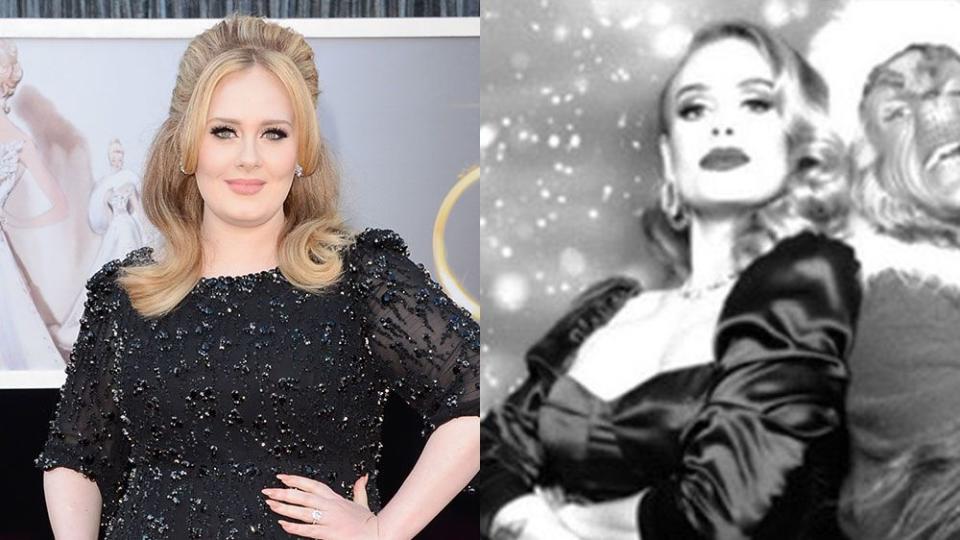
Adele revealed to a fan who spotted her on a recent trip in Anguilla that she's lost 100 pounds. Her trainer, Camila Goodis, also told The Sun that same month that Adele has changed her lifestyle.
“Giving up processed food, sugar, soda and get into an exercise routine, like cardio and strength training, will change people’s body,” Goodis said.
Carrie Underwood
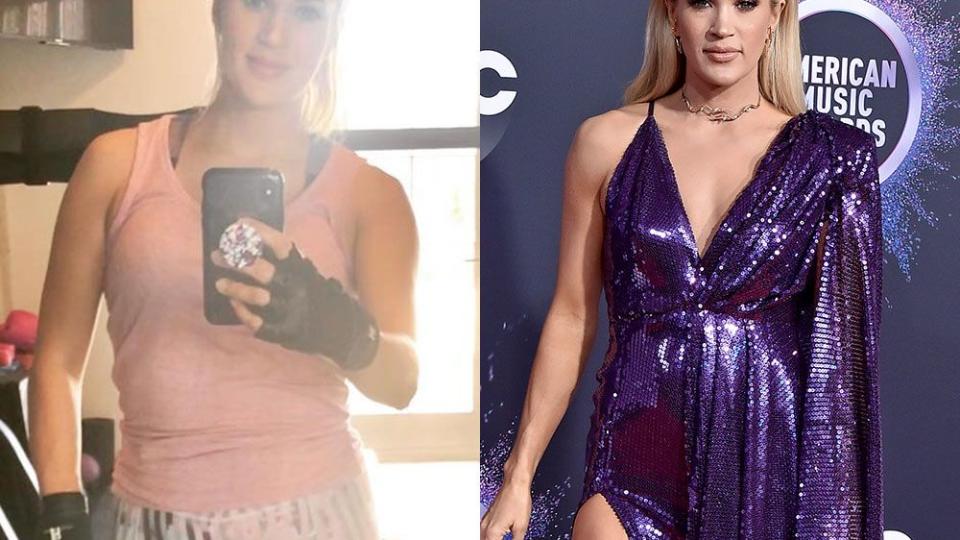
A momma of two, Carrie shared in 2019 that she couldn’t run as fast or lift as heavy as she could before giving birth to her second child. In her caption, Carrie vowed to stop focusing on "bouncing back" and start appreciating her body for what it could do. “I promise to stop analyzing every angle and every curve and every pound and every meal. I’m going to keep staying the path because it is a journey and as long as I’m always working towards my goals, one day I’ll reach them," she shared.
She’s worked out with trainer Eve Overland to get back in shape, and she eats a vegan diet. “To me, working out—my husband has said it— he was like: ‘You’re, like, a more pleasant person to be about when you have a workout in the morning.’ And I was like, ‘I know! I feel better,’' Carrie said.
Rebel Wilson
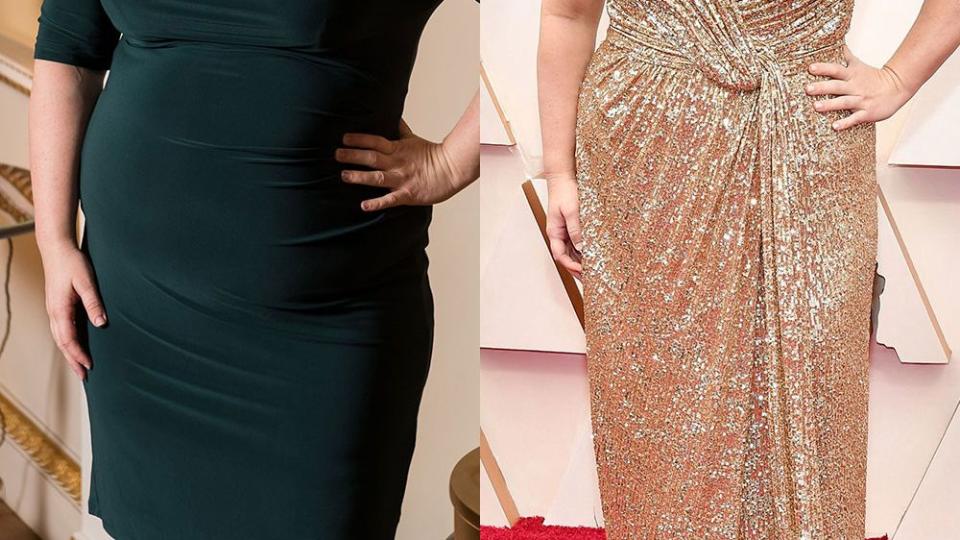
Rebel Wilson has been on a health journey, and she wants to be healthier in 2020 and make some positive life changes. "Okay so for me 2020 is going to be called 'The Year of Health,'" she declared on Instagram, "So I put on the athleisure and went out for a walk, deliberately hydrating on the couch right now and trying to avoid the sugar and junk food which is going to be hard after the holidays I’ve just had but I’m going to do it!"
She’s been working out with trainer Jono Castano seven days a week—and throughout the winter press and awards circuit, she's been looking strong and glowy. Judging by her killer ropes routine, it seems like she's a fan of high-intensity interval training.
Janet Jackson

Janet gave birth to her first baby in early 2017, and by late 2017, she had lost 70 pounds, according to E! News.
Janet’s trainer Paulette Sybliss shared, "I started training her about six weeks after she had Eissa so about March we started. We had a very vigorous training schedule. We were training a minimum of four times a week and the sessions were never less than 45 minutes, no more than an hour. Very intense, though. Very intense training."
Missy Elliott
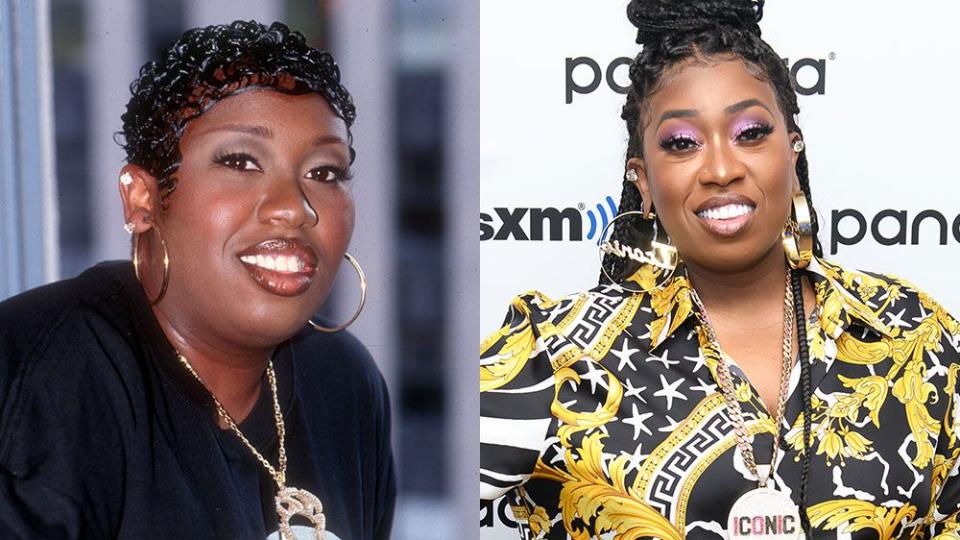
The hip-hop legend has been on a healthy journey in recent years. In 2018 she shared on Instagram, “Proud to say it’s been 4 months I have only drank water no other juices or soda & I cut out bread & Lord knows that’s been the hardest for me!” and that, though she has “NEVER been a water drinker,” her efforts to become one clearly paid off.
“It really restore glow back & I don’t feel sluggish,” she wrote, as reported by People. In 2011, Missy also revealed to People that she was living with Graves’ Disease, an autoimmune illness affecting the thyroid.
Shonda Rhimes
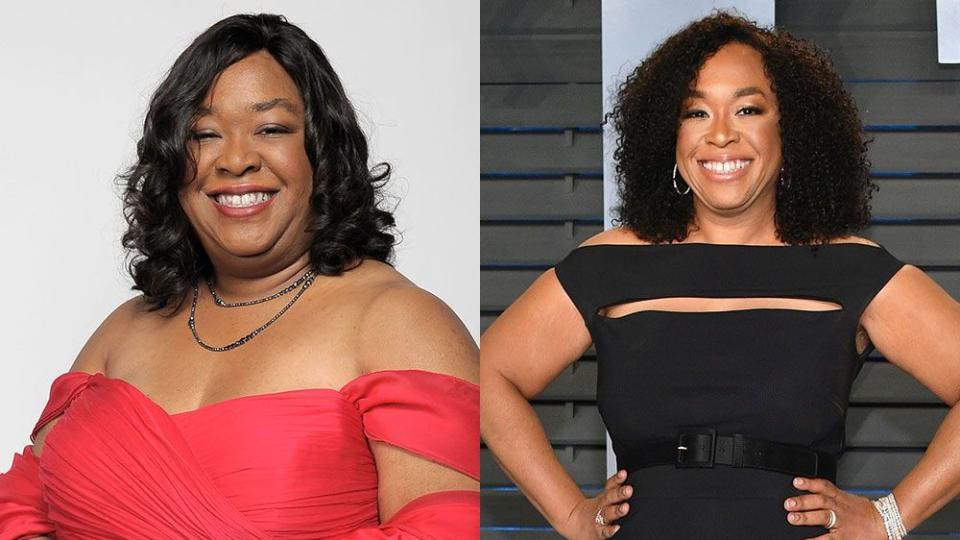
In 2017, Shonda opened up about her 150-pound weight loss to Health. "I did not do it because I thought I would become beautiful like in the movies,” Rhimes said. “I did it because I could not walk up a short flight up stairs without stopping to take a break and wiping sweat from my brow. I did it because my body was physically rebelling against the brain that had been ignoring it for so long.”
Kim Kardashian

Kim gets work done in the gym. "When it comes to booty and legs, we usually work out for an hour and a half to an hour and 45 minutes," Kim’s trainer Melissa Alcantara previously told WH. "You want to work out efficiently and be smart about it."
She also sticks to healthy foods, for the most part. "I live a healthy life and try to eat as plant based as possible and drink sea moss smoothies," she previously told Poosh.
Mariah Carey

The singer told Us Weekly that she strives to work out three times a week and, instead of doing three big meals a day, aims for several smaller meals throughout the day.
Shannon Beador
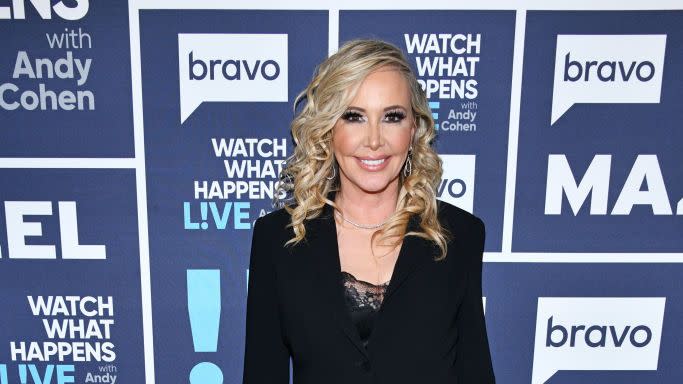
This Real Housewives of Orange County star lost over 40 pounds after a painful divorce in 2019. Shannon revealed on RHOC back in 2017 that she gained weight due to stress. While Shannon is clearly putting in some solid work at the gym, she credits a new mentality with helping her lose the weight. “The hardest work was changing the insides, getting to the mental place where I know I’m gonna be okay and then the weight was just, kinda, a lot easier,” she said. “At a certain point, it just started coming off.”
Briana Culberson
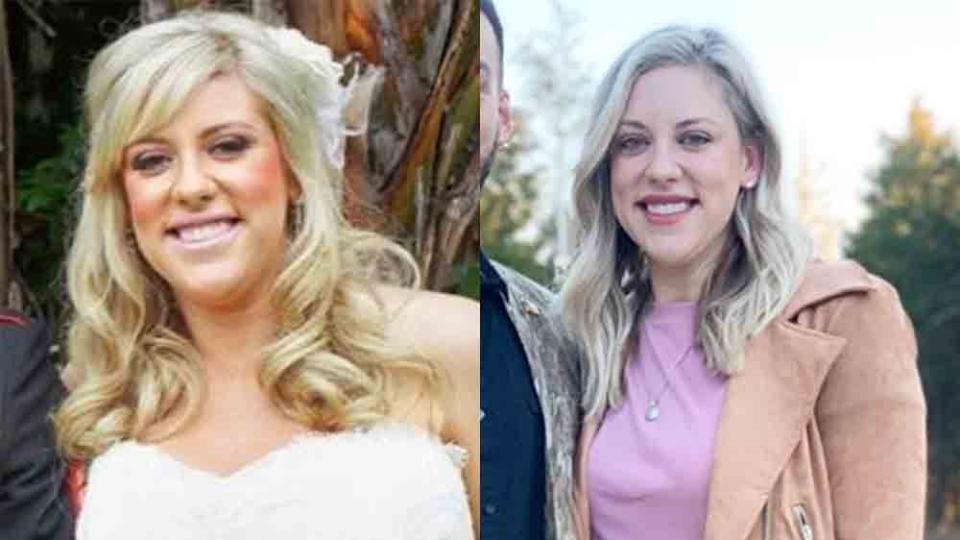
Briana’s husband Ryan has documented their joint weight-loss journey on the keto diet, which has resulted in them losing more than a combined 100 pounds. (In July 2019, they shared that they had lost a combined total of 107 pounds by doing keto.)
In November 2018, he posted that the couple had been doing the keto diet for five months and were already having success.
America Ferrera

America is currently pregnant with baby number two. She welcomed her first child in May 2018. That same year, she shared her love of triathlons and triathlon training with Health.
“I had to change my relationship to my body, and I think the most drastic thing I did was train for a triathlon. I didn’t do it to punish myself. I didn’t do it to lose weight," she said.
She also didn't do it to make her body look a certain way. "I did it as a mental or spiritual challenge of kind of meeting myself, and all my stories about myself, and seeing if I could push through that. And I did," she went on. "Not only did I push through it, I transformed my stories about myself: I’m not a runner. I can’t get in the ocean. I don’t know how to swim. I could never bike that far. All these things that we tell ourselves become what we think we are capable of.”
Daphne Oz

She recently announced that she’s the latest WW Ambassador, and she’s also been sharing her postpartum workouts on Instagram. She gave birth to her fourth child in late 2019, and shared about her first workout: “everyone starts somewhere. 💫#10weekspostpartum just got sweaty and it felt so GOOD!! only my second real workout since having Gigi. I’m not in a rush, I just want to start to feel my core again and strength in my skin. consistency and baby steps get it done 💪 #onmyway #herewego”
Ariel Winter

In 2019, Ariel showed off some noticeable weight loss. She does intense gym seshes, and Ariel also shared that finding the right mental health medication led to unexpected weight loss. “Years ago, it was hard because I’d go to the gym with my trainer and because of my antidepressant medications I never saw results,” she said.
Eventually, she decided to switch medications—but not for aesthetic reasons. “I didn’t change my antidepressants because I wanted to lose weight, I’d just accepted it and it was fine,” she said. “I got inspired to actually find a medication that helped me as a person and did all the things I wanted it to do.”
Teddi Mellencamp
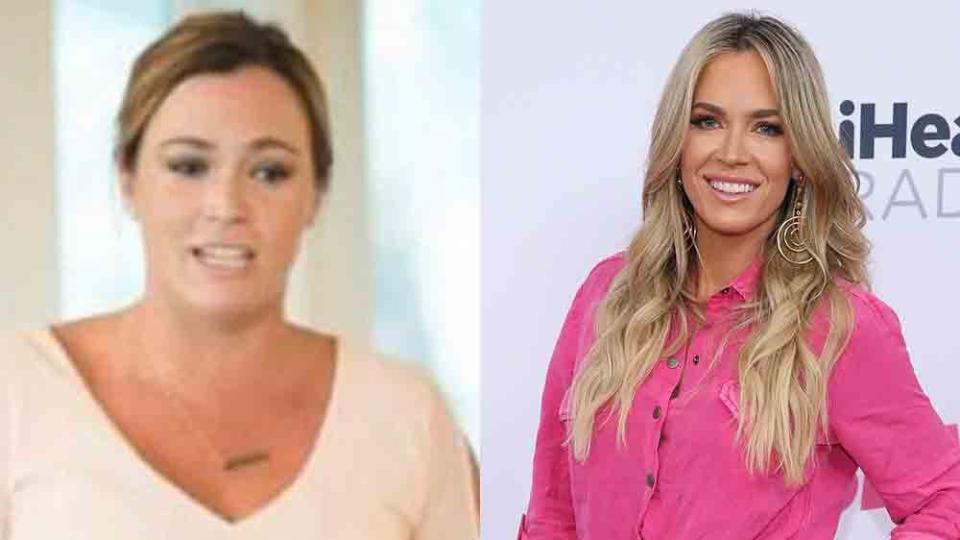
The Real Housewives of Beverly Hills star opened up to WH about how she gained 80 pounds in one year after moving to California and starting a stressful job. She yo-yo dieted for years but continued to struggle with her weight after she became a mother.
“Walking, running, or hiking is just as good a workout as a cardio class at a fancy gym and they’re free. The healthiest meals are often the simplest meals: A good carb, a healthy fat, some protein, and veggies are really all you need. You don’t need to be a chef, much less hire one!” she shared.
Lauren Alaina

The country singer and American Idol alum danced her way to serious weight loss in 2019 after appearing on Dancing With The Stars. She was one of the top-scoring stars competing on the show, and lead the way in pounds lost, too. “I’ve lost, like, 25 pounds since July (2019),” Lauren told People. “None of my clothes fit!” Her pro partner Gleb Savchenko added, “You’re welcome.”
Kate Hudson
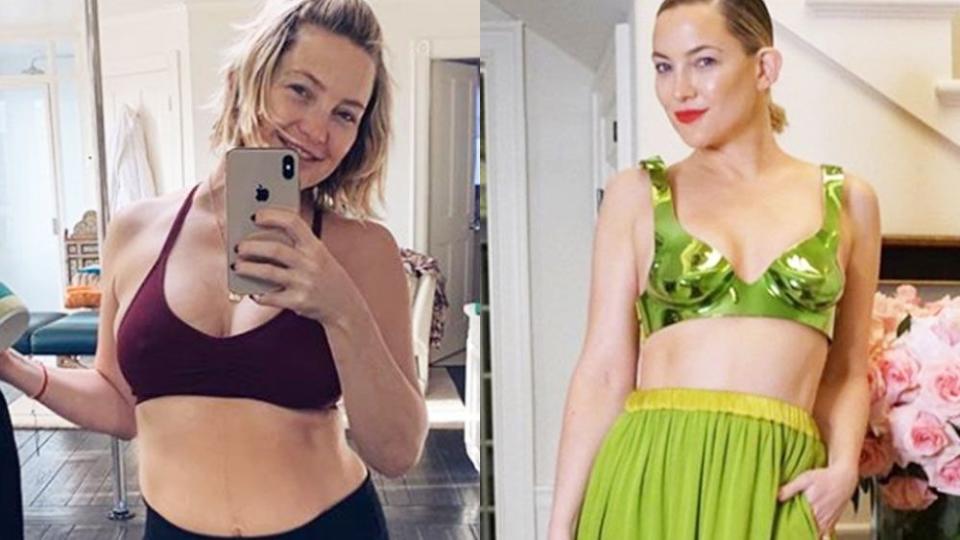
Kate is a brand ambassador for WW and is using the program to help her get back in shape after the birth of her third child in 2019. She joined as a global ambassador last December and announced her weight loss goal of 25 pounds. “It was a smarter way to take weight off, because it stays off. I think the wonderful thing about what that is, is you can eat what you want, you just have to be conscious. It teaches you about food," she said.
Sherri Shepherd
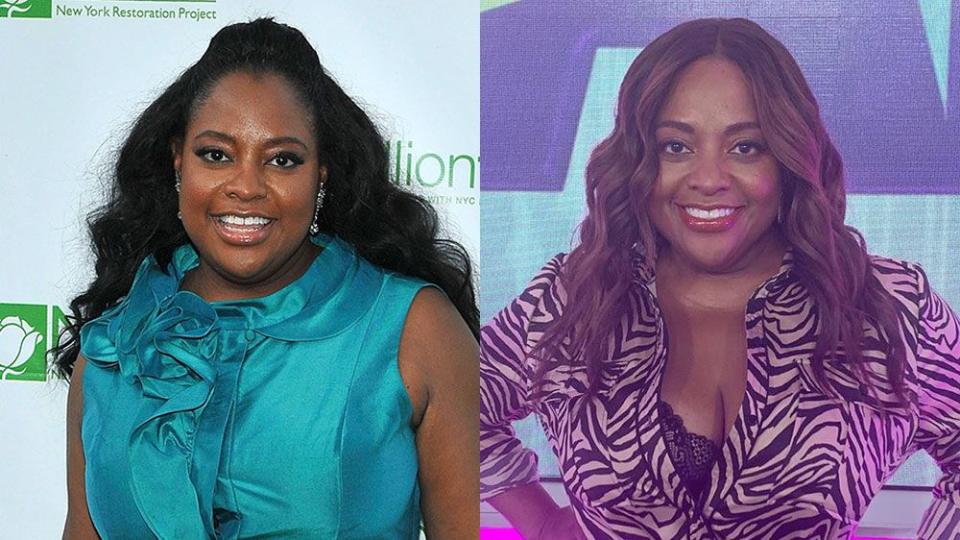
Sherri shared her weight-loss journey on the keto diet with People in February 2019. She revealed that she has lost about 30 pounds, going from 189 to about 159. She also shared her waistline measurements—she’s at 35 inches now, down from 47 inches.
Gabourey Sidibe
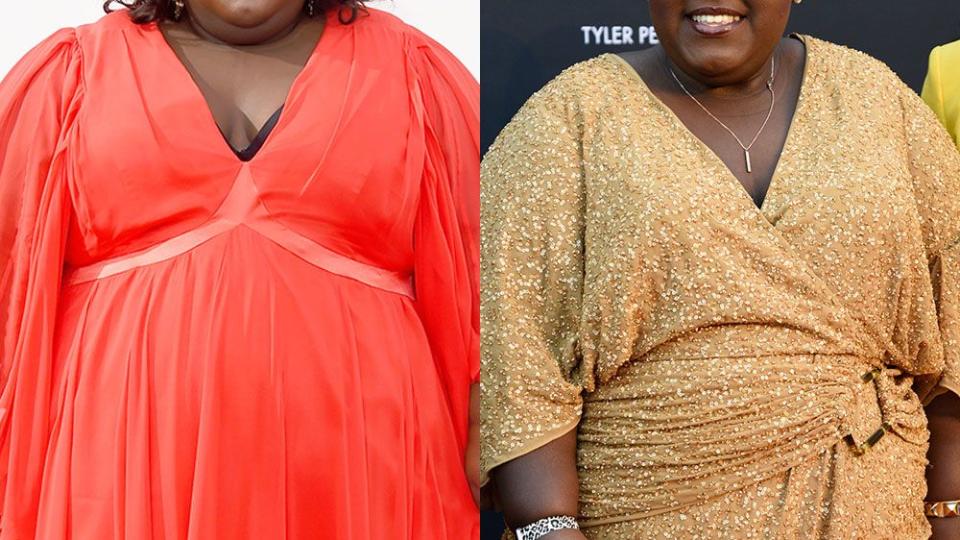
In May 2016 Gabourey revealed she had weight-loss surgery, according to Life & Style. “The surgery wasn’t the easy way out. I wasn’t cheating by getting it done. I wouldn’t have been able to lose as much as I’ve lost without it,” she said about the surgery.
She told People in 2017 she also has a tough workout regime. “I work out with my trainer three to four days a week. If I’m not working out with a trainer, I get up, and I go swim.”
Sarah Rue
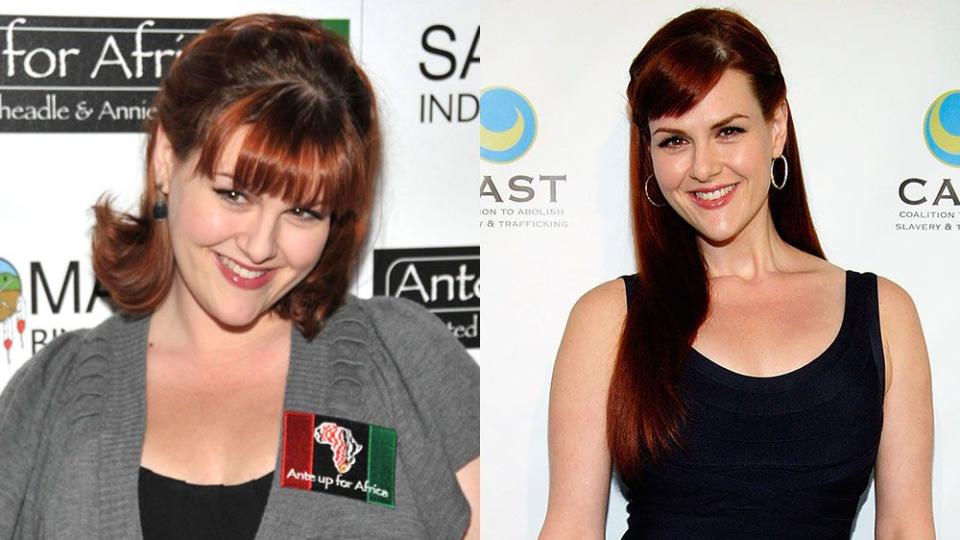
The actress shared with Shape that she used Jenny Craig for her weight loss. "I was never really able to lose weight on my own," Sara said. "Clearly, it was something I struggled with so I wanted a program that provides extra support. Jenny Craig does that. In terms of fitness, I'm going to rely on a professional for that as well. I really don't know anything about [working out] so I'm like 'just tell me what to do!'"
Ricki Lake
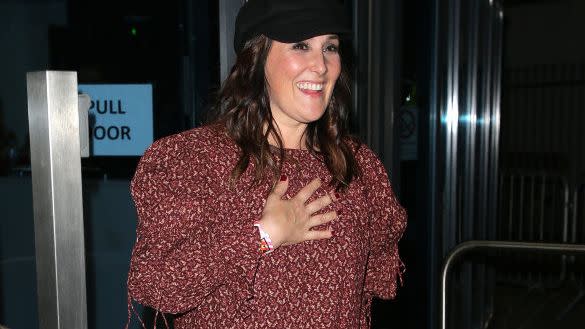
In 2010, actress and TV host Ricki Lake lost over 130 pounds, going from a size 24 to a size 6, according to ABC News. "It's not easy but I'm telling you, I am not superwoman—if I can do it, anyone can do it," she said. "And you don't have to do something extreme. You don't have to have surgery, you don't have to, you know, be in a gym all day long. You just have to be consistent," she said. "And, you know, be a friend to yourself, not be an enemy."
Mo’Nique
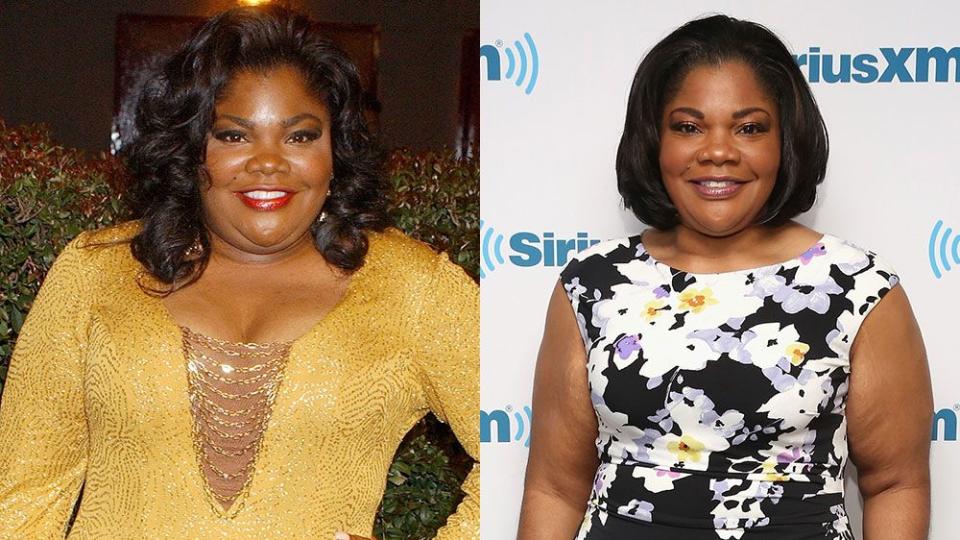
In 2014, comedian and actress Mo’Nique lost 80 pounds and shared the details of how she did it through Twitter, posting about her workouts which included weight lifting and jumping rope, according to ABC News.
Drew Barrymore
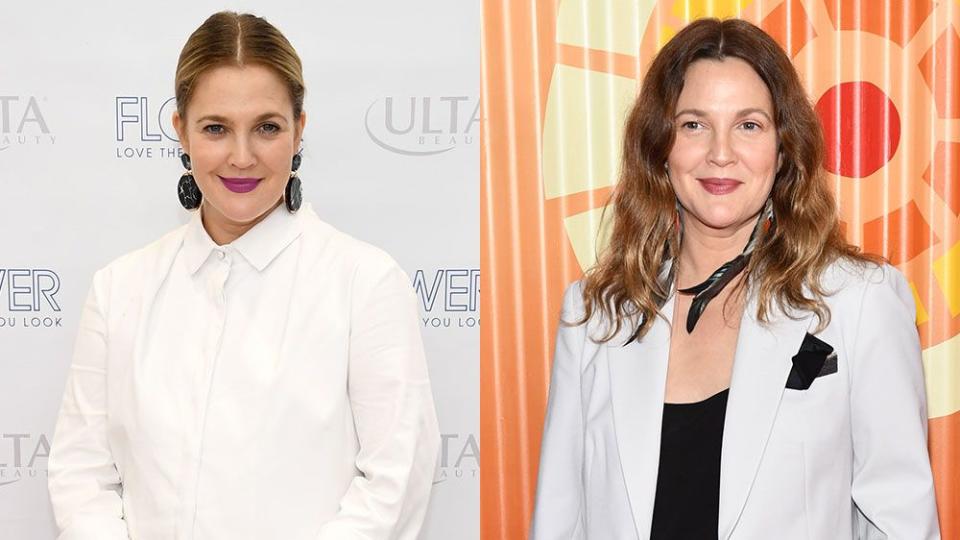
Drew has not been shy about her weight-loss journey, and she gives all the credit to her trainer, Marnie Alton.“This woman is my long time teacher and dear important friend. She has helped me. Healed me. Encouraged me to keep going when I felt like being strong was an insurmountable task,”
Drew captioned a series of photos of her and Marnie working out together recently on Instagram. Drew said she’s known Marnie for about 15 years and that she helped her “transform” her body for the Santa Clarita Diet. “I lost 20 pounds and trained like a mother,” Drew said.
June Shannon (aka Mama June)

In 2017, Mama June from TLC’s Here Comes Honey Boo Boo lost over 300 pounds after weight loss surgery. She underwent a gastric sleeve procedure, known as a vertical sleeve gastrectomy, back in 2015 after she hit a weight-loss plateau.
She also made huge changes to her diet, ditching soda and chips for water and grapes, and started working out regularly.
Jessica Simpson
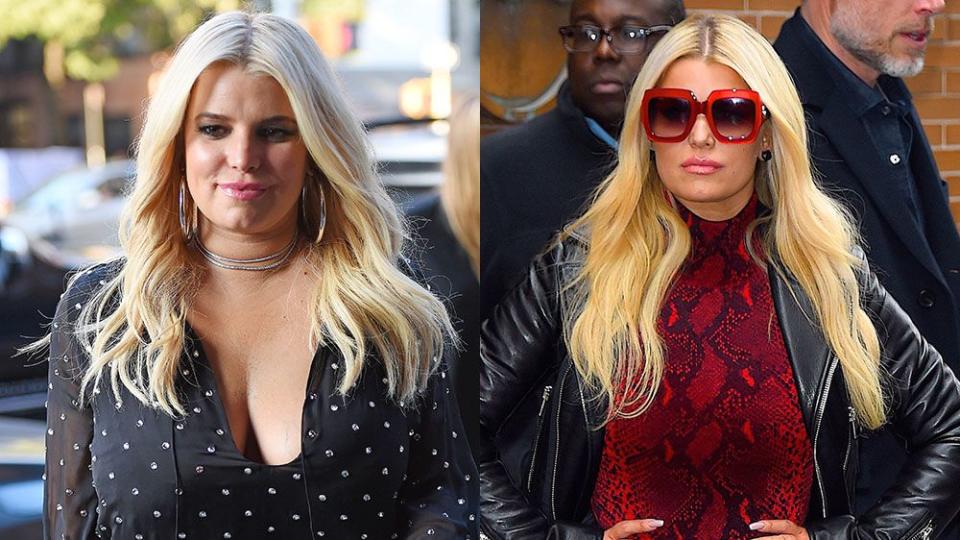
Jessica recently lost 100 pounds after the birth of her third baby, Birdie, with the help of celebrity trainer Harley Paternak. He eased Jessica into activity slowly, starting with walking 6,000 steps daily. “It’s a social thing that she can do with her kids," he said. Slowly, she built up to 14,000 steps, according to E! News.
Jennifer Hudson
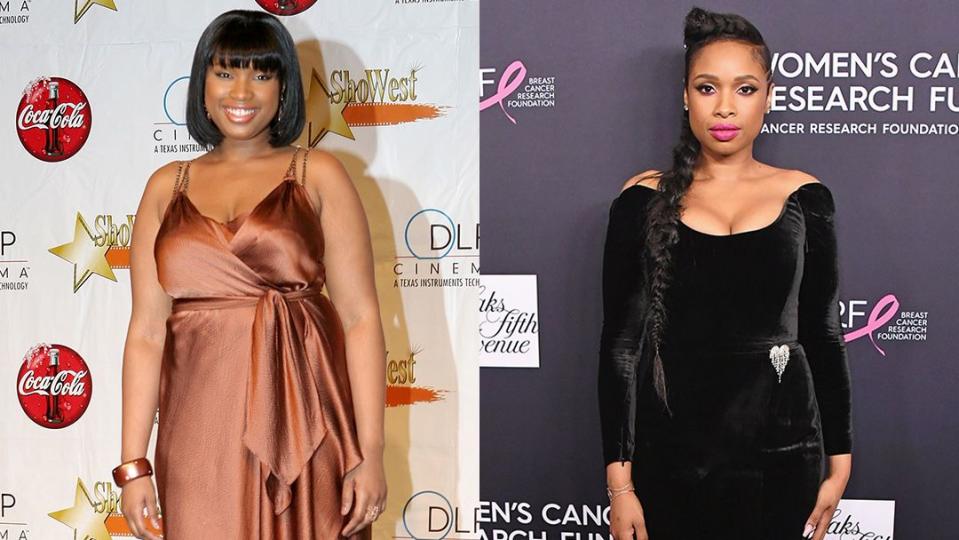
Jennifer Hudson dropped from a size 16 to a size 6 in 2010 after teaming up with Weight Watchers, and she’s kept the 80 pounds off since. "I don't really have time to do much [working out], so I really just watch what I eat," the singer/actress told Good Housekeeping last year. "I'm very careful and cautious of what I'm eating, so I just try to pace those meals throughout the day. I'm very conscious of what I put in my body."
Kelly Osbourne
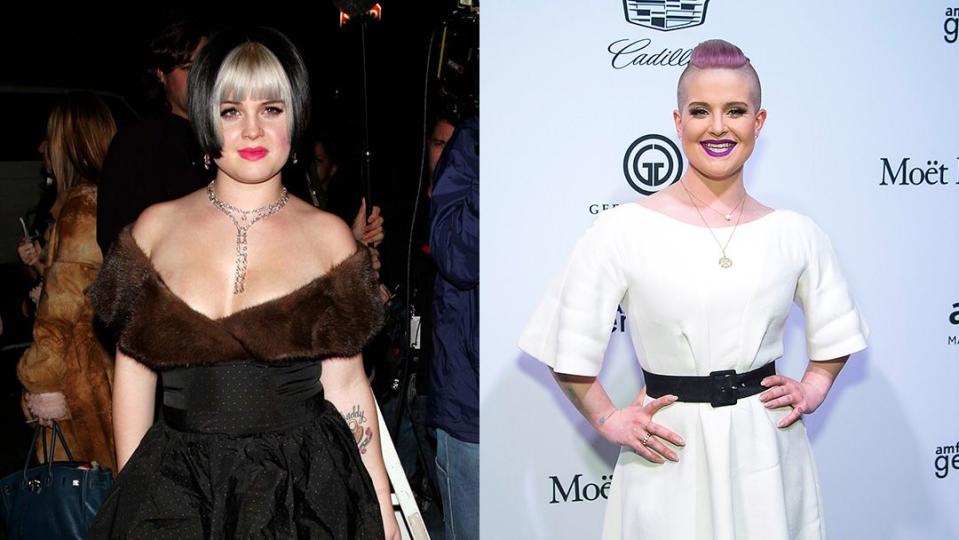
Since she made her TV debut on her family’s reality show, Kelly Osbourne has lost 70 pounds. And participating in Dancing With the Stars in 2009 is where she learned some of her healthiest habits. "[My partner, Louis van Amstel] made me eat turkey burgers and salads and explained to me that a high-protein, low-carb diet would keep me energized," she told Shape magazine at the time. "Then I started losing weight and realized, 'Oh, it’s true what they say: Diet and exercise really work!'"
Melissa Joan Hart
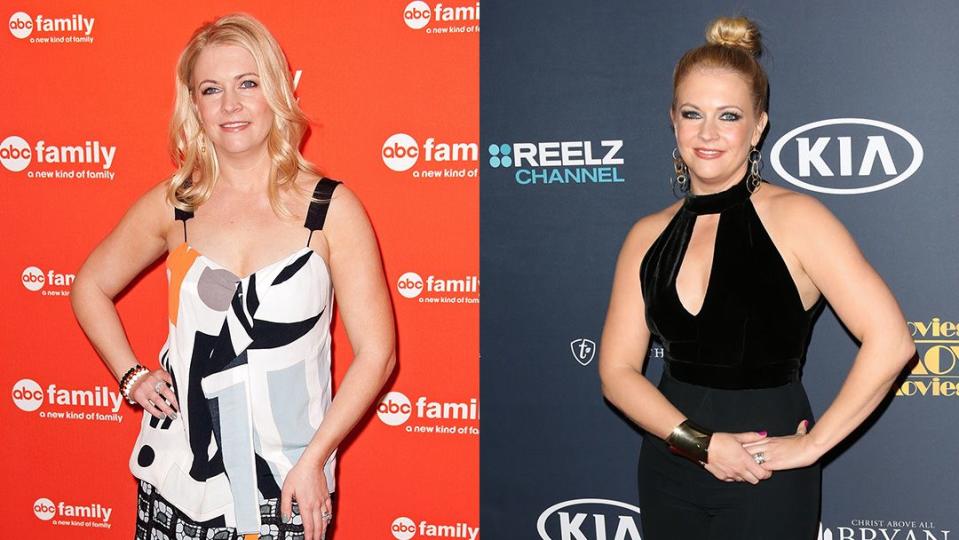
In 2014, Melissa Joan Hart opened up about shedding 75 pounds after giving birth, telling People she was initially inspired by her sister-in-law’s weight loss: "Sally taught me that you want to feel good about yourself. When she first started losing weight, she got compliments and they drive you to want to do more." But it's the social element of fitness that keeps her motivated to work out. "I chitchat with friends on walks or run with my husband," she told Us Magazine.
Kirstie Alley
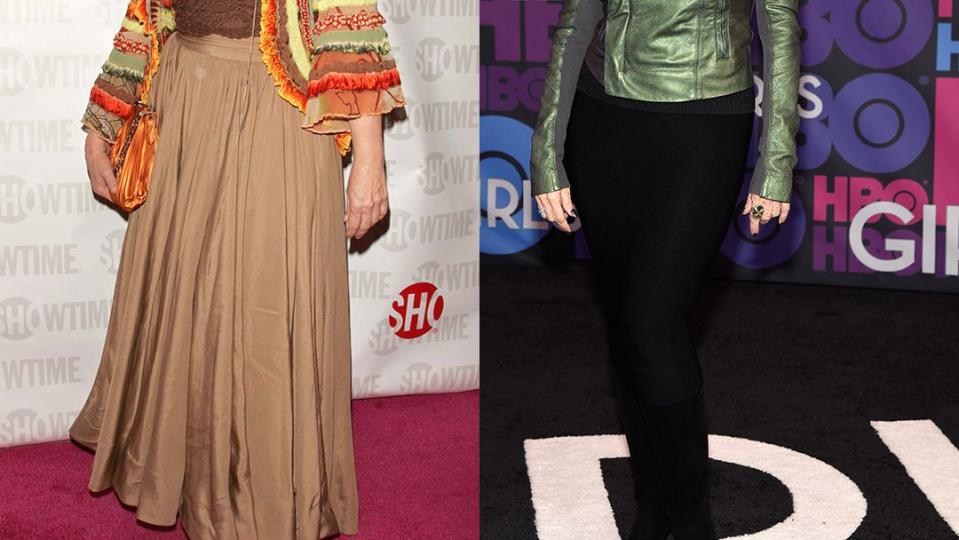
Kirstie Alley first made headlines for her weight loss back in 2006 when she dropped 75 pounds in three years as a spokeswoman for Jenny Craig. She’s gained and lost weight since, but she still maintains a 50-pound weight loss using the program. "I’m on maintenance, so I have one Jenny Craig meal a day and then I’m on my own, but I also have my Jenny Craig consultant," she told People last year. "So if I feel like I’m going awry, I just call her and she gives me some tips and a pep talk."
Adele
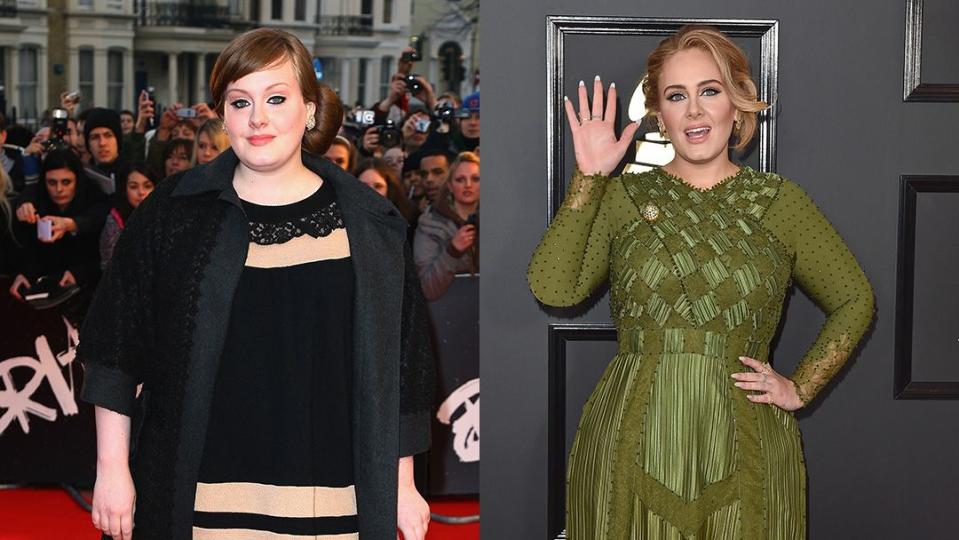
Adele hasn’t shared a number when it comes to how much weight she’s lost, but her figure is noticeably slimmer from when she first topped charts—even after giving birth. But it was never about the scale for her. She decided "to get in shape for myself, but not to be a size zero or anything like that" in 2015, according to Rolling Stone, and cut back on sugar (but not carbs—"I’d never deprive myself like that!" she said) to build stamina for touring.
Christina Aguilera
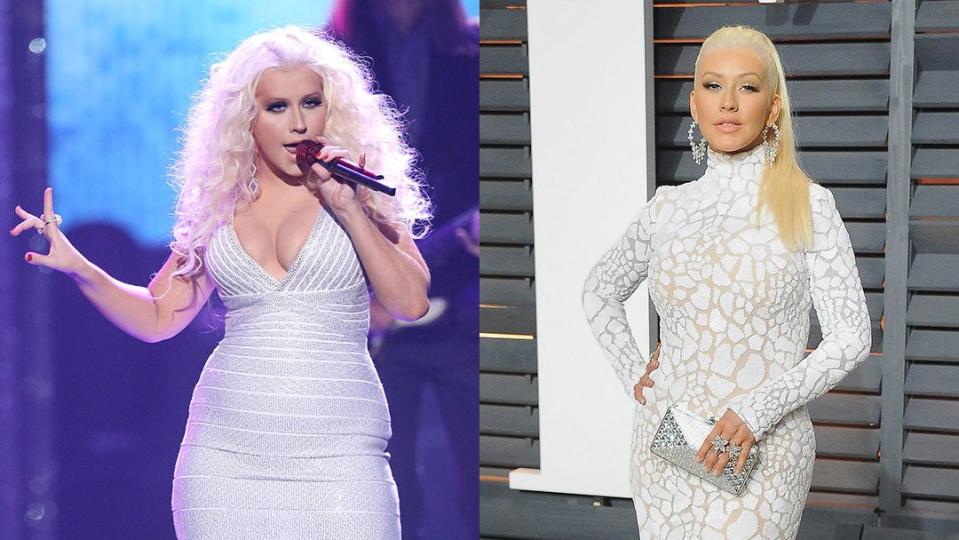
Christina Aguilera shed nearly 50 pounds back in 2013. She took time off from The Voice to do it—"it’s amazing what having some personal time can do, not only for the body but also for the mind and the spirit," a source told People. "She has been trying new types of foods and exploring new methods of exercise. Not for diet or weight, but more for her mind and well being and overall sense of good health." Aguilera also credits reiki, an ancient Asian practice that’s said to heal your body and mind, for her weight loss.
Khloe Kardashian
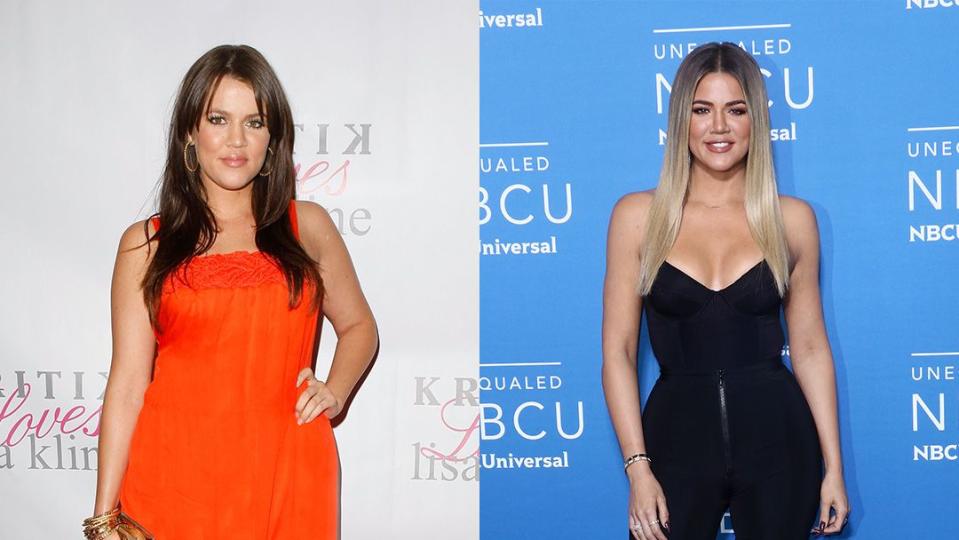
Earlier this year, in a promo for her weight-loss show Revenge Body, Khloe Kardashian admitted that her family actually asked her to lose weight. She’s also documented her weight-loss journey on Instagram—in one before-and-after photo, she referenced her 40-pound weight loss, which she told Women’s Health was motivated by her break-up with ex-husband Lamar Odom. "If you were to ask me five years ago if... I would be an inspiration to many others, that I would be the push that others needed to find their way. I would’ve laughed in your face. Me? The chubby one? No way!" she wrote on Instagram.
Lena Dunham
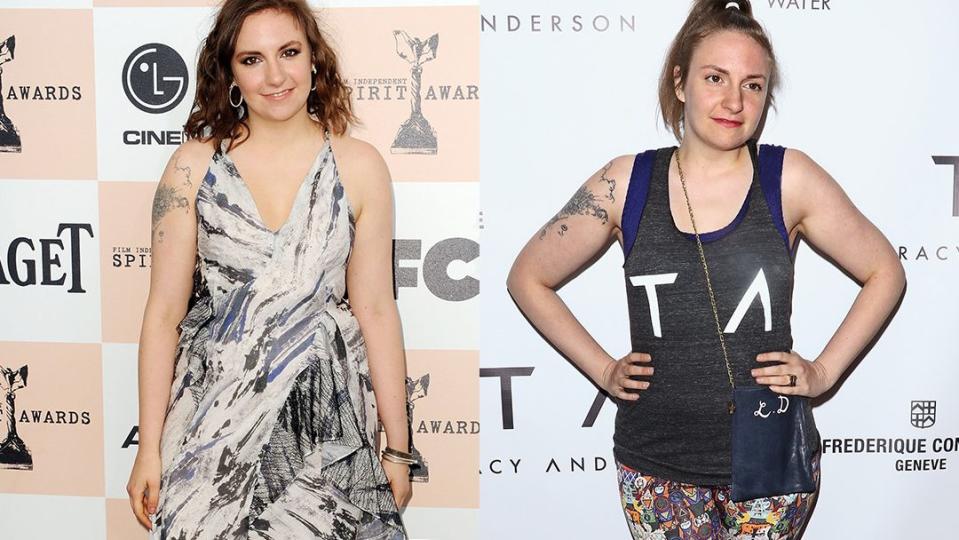
Last year, at an event for trainer Tracy Anderson, Lena Dunham debuted a much slimmer figure than she’d shown off on GIRLS. But it wasn’t about weight loss for Dunham, Anderson told People. "She had significant health issues [OCD and endometriosis]," Anderson said. "She was open and transparent about her health issues, but our convoluted f-ed up celebrity culture was like, 'What diet is Lena doing? Lena lost weight,' and Lena was like, 'I was freaking sick!' She didn’t come to me to make her body look different, she came to me to feel better."
Roseanne Barr
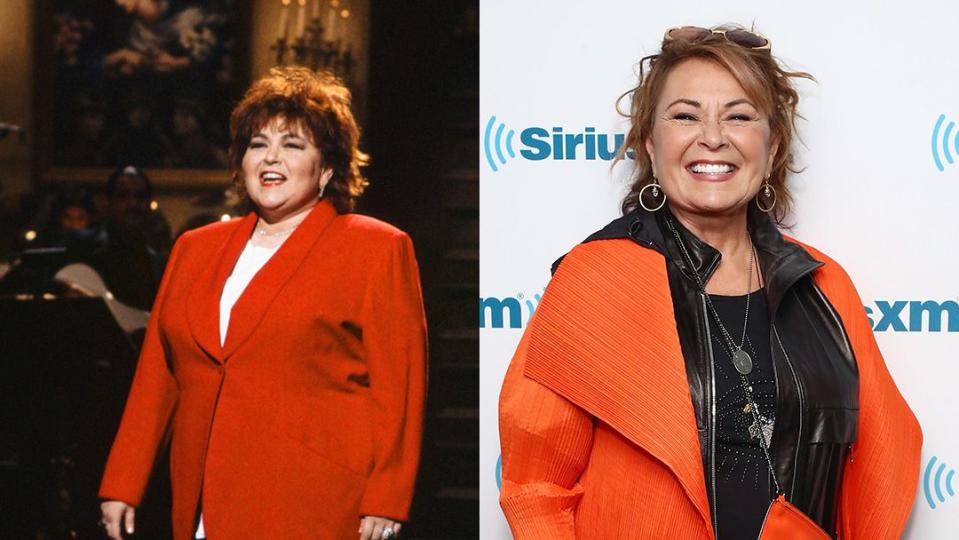
Roseanne Barr—whose Roseanne returned to TV this year—has long been outspoken about her weight. She had a gastric bypass in 1998 ("I had my entire digestive system removed, so I should look thinner," she said per People), which helped her lose 80 pounds. And she lost even more weight in 2014—"I'm just doing the things you're supposed to do…you know, moving more, and eating less,” she told Us Magazine.
Janet Jackson
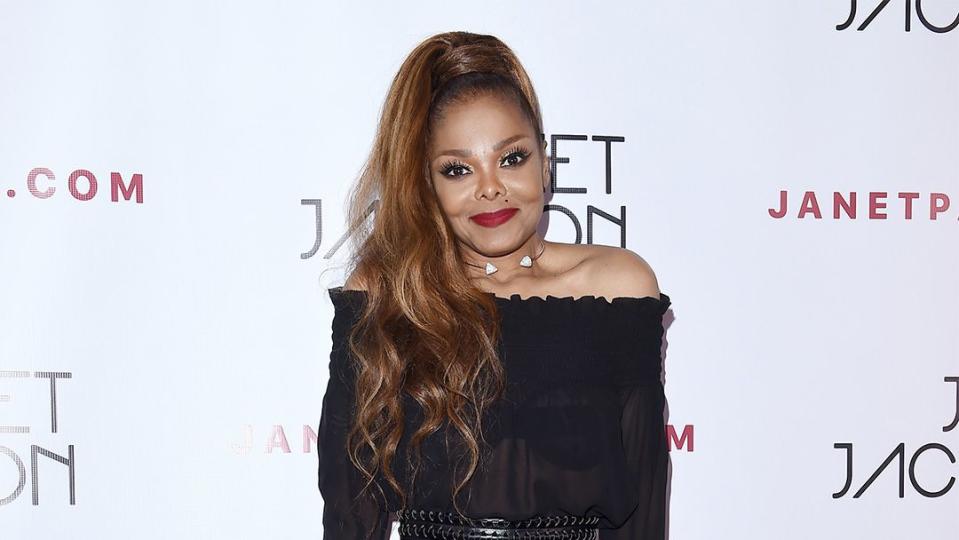
After giving birth at 50 years old last year, Janet Jackson lost 70 pounds working with trainer Paulette Sybliss. "I started training her about six weeks after she had Eissa. We had a very vigorous training schedule," Sybliss told E! News. "We were training a minimum of four times a week and the sessions were never less than 45 minutes, no more than an hour.” And Jackson follows Sybliss’s rule that if she’s eating well 90 to 95 percent of the time, she can eat anything that she wants in moderation. "I don't set her a cheat day at all," she explained. "If Janet feels that she needs to have a chocolate cake, [she can] go ahead and have a chocolate cake."
Nicole ‘Snooki’ Polizzi

Jersey Shore star Nicole ‘Snooki’ Polizzi lost 42 pounds in six months after having her first baby in 2013 by following a 1,300-calorie-a-day diet and working out four days a week with her personal trainer, according to Us Weekly. "Ever since I became a mom and saw all these strong, fit moms at the gym, it was inspirational," she told The Cut. She still trains with Anthony Michael and Adria Bogosian of Anthony Michael Fitness, and has shared her own workouts in addition to writing a book called Strong Is the New hot: My Kickass Story on Getting My Formula for Fierce.
America Ferrera
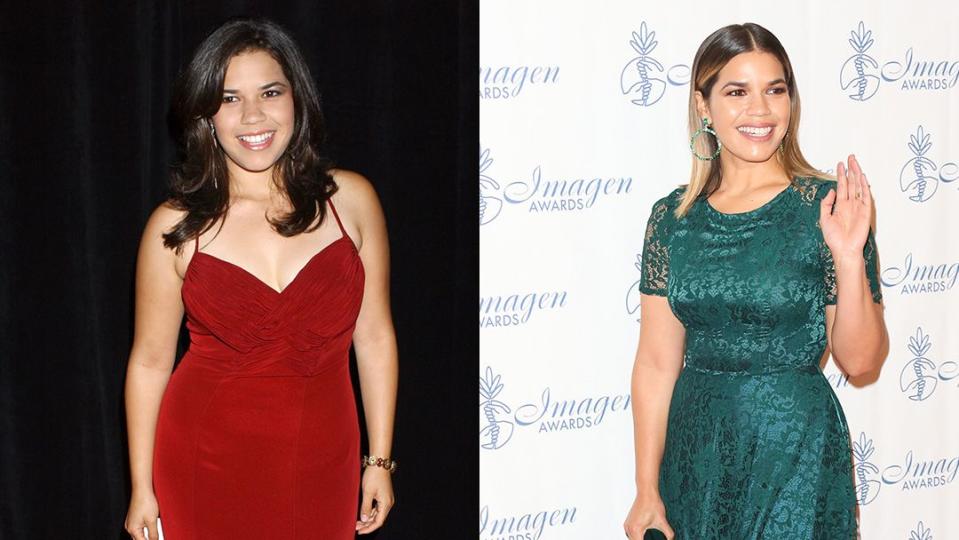
America Ferrera has slimmed down since her Sisterhood of the Traveling Pants days, but she’s focused more on body positivity than jean size. "How much time have I wasted on diets and what I look like? Take your time and your talent and figure out what you have to contribute to this world," the now-pregnant star told Cosmopolitan for Latinas in 2012, "and get over what the hell your butt looks like in those jeans!"
Miranda Lambert

Country singer Miranda Lambert lost about 20 pounds back in 2014 and has kept it off since—without any miracle diet. "You get tired of any diet. I've tried everything," she told Women’s Health. "I just literally would make grilled chicken breast, sweet potato salad. There was no miracle." For the country singer, it wasn’t about the scale, but how she felt as she approached 30. "I just thought, maybe if I get ahead of it a little, I won't have to work so hard later in life," she said to People.
Melissa McCarthy

Back in 2011, Melissa McCarthy told People her body was a "work in progress," but since then, she’s lost a reported 75 pounds. She’s now a size 14, and attributes her weight loss to her laid-back lifestyle. "No trick, nothing to tell, just super boring life. You bring it real down, you don’t do anything fun and you go to bed at 7:30 — that's the trick," she told Extra.
Jordin Sparks

American Idol alum Jordin Sparks lost 50 pounds in 18 months back in 2012, according to E! News. "I just wanted to be healthy," she told Shape at the time. "I remember thinking, 'I'm in my prime. I should be happy and fit.'" Sparks started walking every day and watching her portion sizes, then worked with a trainer to build muscle. "There's no quick or magical way to lose weight," she told Redbook. "You just have to do it the natural way—diet and exercise and stick to it—and be able to do it at your own pace."
15. You’re getting older and aren't strength training.
All the diet and exercise in the world won’t cancel out the fact that it’s just plain harder to lose weight the older you are. In your 20s, you might be able to cut back on booze and cake for a few weeks when you want to lose five pounds, but in your 40s, it’s gonna take more effort. That's because as we get older, "our hormones shift a little bit, our metabolism also shifts with it," says Zeitlin, adding that that's why it's harder to lose weight.
The fix: Focus on resistance training to build muscle mass, which can ultimately help you burn more at rest, and in turn, jumpstart your weight loss if you're stuck.
16. You’re stressed or depressed.
Major life changes, like divorce or a death in the family, are often a trigger for weight gain. Stress eating is a real thing, and when you’re depressed, you’re typically not focused on counting calories or exercising (because it takes so much effort just to make it through the day).
Cortisol, a.k.a., the stress hormone, works with the rest of our hormones in a see-saw effect, so when one increases, the others decrease, Zeitlin explains. Essentially, when cortisol levels are high, insulin (which regulates our body's sugars) levels go down, meaning that it's not breaking down glucose, so it ends up being stored as fat. So, even if your diet and exercise habits haven't changed, if you're super stressed at work, it might be harder to lose weight (and you might even gain it) because of that.
The fix: Dr. Weiner recommends finding holistic ways to manage your stress, even if it’s simply low-impact cardio. And of course, if you’re feeling depressed, don’t hesitate to get help from a mental health provider.
17. You have unresolved trauma.
While this is heavy stuff, it's important to be aware of the correlation between abuse and weight gain. A history of sexual abuse is linked to weight gain, in particular, and the number of people who have been sexually abused, especially at a young age, is staggering: One in three American women report experiencing some kind of sexual violence in their lifetime, per the National Sexual Violence Resource Center.
The fix: Whether you’re a child or an adult (and whether or not your history is affecting your weight), seek out resources that can help victims of sexual violence or other abuse. Therapy can also be a good way to work through trauma.
18. You’re taking certain medications.
A possibly hidden reason why you’re struggling to lose weight: You’re on a medication that can cause weight gain as a side effect. This includes diabetes medications, antidepressants, and steroid medications, among others.
The fix: Dr. Weiner suggests talking to your physician about your medications; sometimes they can be adjusted to make weight loss more possible.
19. You're struggling with food addiction.
If you find yourself desperately craving food at all costs—and it’s sabotaging your diet and exercise efforts—you could be dealing with food addiction. This doesn’t mean you’re not motivated or “strong enough” to defeat your cravings and lose weight; you may have developed an emotional reliance on food.
The fix: If you are prone to binging or gorging, focus nonstop on food, have trouble functioning in your job or personal life, or suffer from anxiety, depression, or insomnia, reach out to a healthcare provider ASAP to be evaluated for food addiction. It’s a type of eating disorder, and there is help available.
20. You’re eating too often.
While eating smaller, more frequent meals throughout the day can be a healthy approach to weight loss, for some, it might lead to an excess of calories by the evening. For those people, intermittent fasting might lead to better results. Dr. Weiner agrees, saying that getting the right amount of calories in a short period of time followed by a longer period of time where you get little to no calories can be more beneficial to your health than eating all day long.
The fix: Talk to your doctor or a nutritionist before trying an intermittent fasting diet, this way they can help you figure out a schedule that makes sense for you. (For the record, the 16:8 or 14:10 diet is usually recommended for beginners.) There are also some groups of people for which intermittent fasting is not recommended, like anyone with blood sugar regulation issues (e.g., diabetes) and pregnant people.
21. You’re doing intermittent fasting, but not eating right.
That said, intermittent fasting alone isn’t a magic tool for weight loss, Gans says—you still need to be aware of what you’re putting into your body. If you’re not losing weight on a fasting diet, you may still be consuming too many calories during your feeding window.
“You could still be eating too much, foods that are poor in nutrients, or low-calorie foods that aren’t filling you up and leaving you feeling hungry all the time,” Cording says.
The fix: Avoid ultra-processed foods, which tend to be higher in saturated fats, sodium, and trans fats. You should also practice mindful eating to make sure you don't overindulge during your feeding window, and fill up with whole foods that pack a ton of fiber and protein to stay satiated throughout the day.
22. You’re not doing a calorie deficit right.
At baseline, being on a calorie deficit means that you’re taking in less calories than you burn. It can be tricky to perfectly calculate what kind of deficit you should be on, but the National Institutes of Health has a body weight planner that can at least give you some idea of how much you’ll need to cut out in order to see results.
But you also need to keep track of what you’re eating all day, Gans says. “You may think you are on a calorie deficit, but somewhere throughout your day, you are actually consuming more calories without realizing it,” she says. Having too few calories in your day can also be problematic, Cording says—it can leave you hungry and more prone to overeat.
The fix: A general rule of thumb is that you don’t want to cut out more than 500 calories a day from your eating plan. And use a tracking app to make sure you're hitting your calorie goal every day.
23. You’re having healthy fats, but too many of them.
“Even the ‘good-for-you’ fats have calories,” Gans says. The more you eat, the more the extra calories will add up. Knowing portion sizes can help. For example, a serving size of peanut butter is two tablespoons, a third of a medium avocado is one serving, and one tablespoon of oil is a serving.
The fix: A food diary or tracking app can help you assess the amount of healthy fats you're eating in a day. Writing down what you are eating even for a short period of time can help you understand how much you should be consuming each day.
24. You’re distracted when you eat.
Sometimes you need to grab lunch at your desk or maybe you prefer to eat dinner in front of the TV. While it’s okay to do this here and there, regularly being distracted while you’re eating raises the odds that you’ll have more food than you need or planned to have, Cording says.
“When you’re distracted, the communication between your mind and body is disrupted,” she explains. “You’re less in tune with your hunger and fullness cues.”
The fix: Try committing to taking a lunch break or turning your devices off during mealtimes.
25. You’re not eating on a predictable schedule.
You don’t need to eat every meal at set times, but having some consistency is important, Cording says. “When you don’t have much consistency, you can get caught off-guard by hunger and then reach for whatever is around,” she says. “That can lead to you making less healthy decisions and overeating.”
The fix: Gans recommends eating every four to five hours, so you’ll be less likely to overeat at mealtime.
Tips To More Effectively Lose Weight
Weight loss is not a one-size-fits-all approach, but the following tips can help kickstart your journey, according to Dr. Rao.
Focus on a balanced diet. “The key to weight loss is not restriction, but rather the integration and abundance of nutrient-dense foods,” says Dr. Rao. Nutrient-dense plant foods are rich in fiber, vitamins, and minerals and lower in calories compared to processed foods, she explains. “Processed foods have been stripped of their nutrients, and high-energy components such as oils and sugar are added in their place which means fewer nutrients, more calories, and often leaves you craving more food than you need.” The solution? Integrate more fresh, whole foods. Think: fruits, vegetables, lean protein like chicken, turkey, eggs, tofu, and fish, and complex carbs such as quinoa, sweet potatoes, barley, and oats.
Move your body. If you’re a fitness newbie, it can be daunting to know where to start, but Dr. Rao says weight loss is all about moving your body. “I encourage something as simple as walking because anyone can walk, everyone knows how to walk, and you don’t need an expensive membership to do so, so aim for 10,000 steps a day,” she explains. Strength training at least twice a week is also extremely important since it boosts your metabolism and increases and/or maintains muscle mass as you age, she adds.
Eat more fiber. Fiber is a gold-standard when it comes to weight loss since it helps keep you fuller for longer, in turn, reducing your appetite and lowering your caloric intake, says Dr. Rao. “Because fiber slows down digestion, food remains in your stomach for a longer period of time, satiating you and preventing hunger pangs,” she explains. “As a result, you might eat less overall because you don't feel as hungry, but fiber is also key in maintaining your gut health and has been shown to lower cholesterol levels.”
Snack mindfully. Paying attention to your body's signals of hunger and fullness is one of the foundational principles of weight loss, says Dr. Rao. “By doing so, you can avoid overeating and pointless snacking, both of which can lead to weight gain,” she explains. Slow down during meals, focus on portion size, and ask yourself if you’re truly hungry before opting for another serving, she adds.
Talk with your doctor. If you’re concerned about your weight or discouraged by the results, Dr. Rao says to talk with your doctor. From there, they can address any underlying health conditions and work with you to create a personalized plan. Weight loss medications may also be considered if needed (in combination with an improved diet and lifestyle changes), so talk to a doctor about your options, she adds.
You Might Also Like

